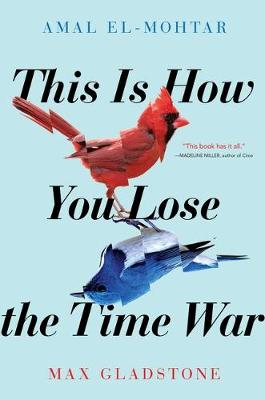
nannah
Content warnings:
- self-harm
Representation:
- both protagonists are sapphic
- one of the protagonists is a person of color
Two sides fight a war using time and potential futures, trying to win the best possible future for themselves. What begins as an agent from one side writing a mocking letter to another on the opposite side ends with both of them falling in love. But in this war in which winning means losing a love, is it possible to find a happy outcome?
I don't think I've ever read an epistolary novel … it gets a bit tedious, to be honest, but perhaps that's just because I'm not used to it. That said, I fell in love with the writing style(s) at the very first line. And there are some absolutely gorgeous lines, too — my favorite being "I want to meet you in every place I ever loved." The main characters also give us information about things, even about themselves, at a very satisfyingly slow rate. It's a good way to keep the interest up.
Another interesting thing about this book is the lack of any described setting, or not much of it. Another reviewer said it very well (and I can't remember who it was, sorry!): "We never get a setting, because the setting doesn't matter. This is, in essence, a pure romance book." What matters is not the war around them, but the relationship developing between these two agents themselves.
I do wish, however, that the two leads had more distinct voices. I don't doubt that they're two different people, Red being a robot or cyborg who's kind of stiff and not used to being social, and Blue being an organic shape-shifting creature with a sense of humor and a love for pop culture. But very little of this comes through the actual language of the letters themselves. I don't think I could tell their voices apart if I was shown an example (which is funny, because each author wrote a different character — they work really well together!).
Afterthoughts: after sitting on this for a couple months, I think one of the reasons people love this book so much is that apart from 2-3 character traits, the MCs don't really have fully fleshed personalities to distinguish them. In this way, it's easy to project onto them as a sort of wish fulfillment. And this isn't a criticism. Because this book is so unique, I think it works here.


